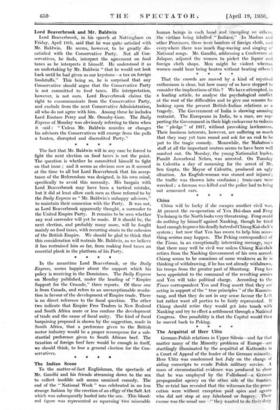The fact that Mr. Baldwin will in any case be
forced to fight the next election on food taxes is not the point. The question is whether he committed himself to fight on that issue ; and it seems as obvious now as it seemed at the time to all but Lord Beaverbrook that his accep- tance of the Referendum was designed, in his own mind, specifically to avoid this necessity. His bargain with Lord Beaverbrook may have been a tactical mistake, but it did at least allow such men as those referred to by the Daily Express as "Mr. Baldwin's unhappy -advisers," to maintain their connexion with the Party. It was not, as Lord Beaverbrook apparently thought, a surrender to the United Empire Party. It remains to be seen whether any real surrender will yet be made. If it should be, the next election, and probably many more, will be fought mainly on food taxes, with recurring strain to the cohesion of the British Empire. We should be glad to think that this consideration will restrain Mr. Baldwin, as we believe it has restrained him so far, from making food taxes an essential plank in the platform of his Party.










































 Previous page
Previous page